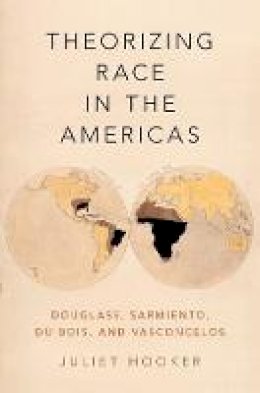
Stock image for illustration purposes only - book cover, edition or condition may vary.
Theorizing Race in the Americas: Douglass, Sarmiento, Du Bois, and Vasconcelos
Juliet Hooker
€ 126.15
FREE Delivery in Ireland
Description for Theorizing Race in the Americas: Douglass, Sarmiento, Du Bois, and Vasconcelos
Hardback. Num Pages: 280 pages. BIC Classification: 1KL; JFSL1; JPA; JPB. Category: (G) General (US: Trade). Dimension: 235 x 156. .
In 1845 two thinkers from the American hemisphere - the Argentinean statesman Domingo Faustino Sarmiento, and the fugitive ex-slave, abolitionist leader, and orator from the United States, Frederick Douglass - both published their first works. Each would become the most famous and enduring texts in what were both prolific careers, and they ensured Sarmiento and Douglass' position as leading figures in the canon of Latin American and U.S. African-American political thought, respectively. But despite the fact that both deal directly with key political and philosophical questions in the Americas, Douglass and Sarmiento, like African-American and Latin American thought more ... Read more
In 1845 two thinkers from the American hemisphere - the Argentinean statesman Domingo Faustino Sarmiento, and the fugitive ex-slave, abolitionist leader, and orator from the United States, Frederick Douglass - both published their first works. Each would become the most famous and enduring texts in what were both prolific careers, and they ensured Sarmiento and Douglass' position as leading figures in the canon of Latin American and U.S. African-American political thought, respectively. But despite the fact that both deal directly with key political and philosophical questions in the Americas, Douglass and Sarmiento, like African-American and Latin American thought more ... Read more
Product Details
Publisher
Oxford University Press Inc
Format
Hardback
Publication date
2017
Condition
New
Weight
28g
Number of Pages
296
Place of Publication
New York, United States
ISBN
9780190633691
SKU
V9780190633691
Shipping Time
Usually ships in 15 to 20 working days
Ref
99-29
About Juliet Hooker
Associate Professor of Government and African and African Diaspora Studies, University of Texas-Austin; author of Race and the Politics of Solidarity (OUP, 2009)
Reviews for Theorizing Race in the Americas: Douglass, Sarmiento, Du Bois, and Vasconcelos
Apart from..the considerable merits of political insight and intelligence displayed in its composition, [Theorizing Race in the America] is particularly valuable for the theoretical originality and ingenuity of its conception. - Charles W. Mills, Perspectives on Politics Hooker's Theorizing Race in the Americas makes a valuable contribuAtion to both Latinx and Africana thinking and research on race. It offers ... Read more
